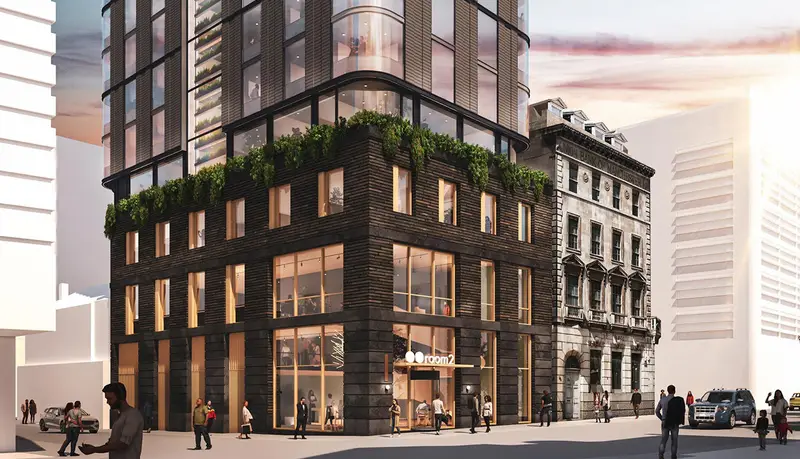A developer is on the brink of launching a new ‘hometel’ project on the long-vacant Union Bank of Manchester site on Piccadilly.
The proposed 34-storey structure aims to rejuvenate the area, with plans already endorsed by the city council’s planning committee.
Introduction to the Development
A developer is moving forward with a ‘hometel’ project on a vacant site on Piccadilly. The Union Bank of Manchester building, unoccupied since 2006, is the focal point of this ambitious plan. Approval is recommended by the city council’s planning committee.
The proposal by operator Room2 envisions a 34-storey structure. This latest application aims to surpass the previously approved 23-storey plans. The site has seen numerous planning permissions expire since 2007. Notably, the new ‘hometel’ project intends to create a taller structure that revitalises the area.
Historical Context
The Union Bank of Manchester, a prominent structure on Piccadilly, has been boarded up for almost two decades. Described as “one of the best buildings on Piccadilly” by architectural writer Jonathan Schofield, it has suffered from neglect.
Previous permissions for developments on this site include approvals in 2007, 2013, and 2019, all of which lapsed. The current proposal envisions not only restoring but also enhancing the building, retaining its architectural significance.
Project Details
The new scheme includes restoring the bank’s ornate ceiling, removing non-original features, and relocating stained glass windows to the ground floor bar. These design choices aim to preserve the building’s historical elements while introducing modern facilities.
The project’s ambition extends to creating the UK’s first net zero tower. The developer aims to incorporate sustainable features, including electric-only systems and green infrastructure, echoing their other successful hotels in London, Southampton, and Belfast.
The ‘hometel’ concept blends the comfort of home with hotel services. This unique accommodation option appeals to both corporate and leisure guests seeking alternative residences.
Community and Objections
Despite the innovative design, the proposal has faced objections from some quarters. Descriptions such as “obnoxious” and “oppressive” have been voiced, criticising the building’s height and scale.
Concerns include claims that the new structure is out of scale with the adjoining bank building and that it lacks symmetry with neighbouring structures. Critics believe it will fail to create a welcoming atmosphere for visitors arriving at Piccadilly station.
Planning and Approvals
Officers have recommended approval for this planning application, set to be decided by the city council’s planning and highways committee on 29th August. Their recommendation signals a strong endorsement of the project’s potential benefits.
Should the project receive approval, it promises to deliver a significant transformation, contributing to the local economy and urban landscape. The project’s alignment with sustainable development goals further strengthens its appeal.
Future Prospects
The success of this ‘hometel’ project could pave the way for similar developments in the north of England. Room2’s expansion strategy includes bringing this innovative concept to new markets, starting with Manchester.
The integration of modern amenities within historic buildings sets a precedent for future urban development. It highlights the balance between preservation and progress, offering a template for other cities.
Conclusion to Approvals
With only a few days remaining until the decision, anticipation surrounds this project. The proposed ‘hometel’ plan is a blend of traditional restoration and innovative design. All eyes are on the city council’s upcoming decision.
Final Thoughts
If successful, the transformation of the Union Bank of Manchester into a ‘hometel’ will serve as a benchmark for sustainable urban development.
By merging historical preservation with modern sustainability, this project represents a forward-thinking approach to urban regeneration.
The approval of this ‘hometel’ project could mark a significant turning point for Piccadilly, spearheading sustainable urban development.
The blend of historical preservation and innovative design sets a new standard for future projects in the city.

